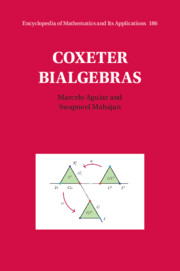Book contents
- Frontmatter
- Contents
- Preface
- Introduction
- Preliminaries
- Chapter 1. Coxeter groups and reflection arrangements
- Part I. Coxeter species
- Chapter 2. Coxeter species and Coxeter bimonoids
- Chapter 3. Basic theory of Coxeter bimonoids
- Chapter 4. Examples of Coxeter bimonoids
- Chapter 5. Coxeter operads
- Chapter 6. Coxeter Lie monoids
- Chapter 7. Structure theory of Coxeter bimonoids
- Part II. Coxeter spaces
- Chapter 8. Coxeter spaces and Coxeter bialgebras
- Chapter 9. Basic theory of Coxeter bialgebras
- Chapter 10. Examples of Coxeter bialgebras
- Chapter 11. Coxeter operad algebras
- Chapter 12. Coxeter Lie algebras
- Chapter 13. Structure theory of Coxeter bialgebras
- Part III. Fock functors
- Chapter 14. Fock functors
- Chapter 15. Coxeter bimonoids and Coxeter bialgebras
- Chapter 16. Adjoints of Fock functors
- Chapter 17. Structure theory under Fock functors
- Chapter 18. Examples of Fock spaces
- Appendix A. Category theory
- References
- List of Notations
- List of Tables
- List of Figures
- List of Summaries
- Author Index
- Subject Index
Chapter 11. - Coxeter operad algebras
Published online by Cambridge University Press: 27 October 2022
- Frontmatter
- Contents
- Preface
- Introduction
- Preliminaries
- Chapter 1. Coxeter groups and reflection arrangements
- Part I. Coxeter species
- Chapter 2. Coxeter species and Coxeter bimonoids
- Chapter 3. Basic theory of Coxeter bimonoids
- Chapter 4. Examples of Coxeter bimonoids
- Chapter 5. Coxeter operads
- Chapter 6. Coxeter Lie monoids
- Chapter 7. Structure theory of Coxeter bimonoids
- Part II. Coxeter spaces
- Chapter 8. Coxeter spaces and Coxeter bialgebras
- Chapter 9. Basic theory of Coxeter bialgebras
- Chapter 10. Examples of Coxeter bialgebras
- Chapter 11. Coxeter operad algebras
- Chapter 12. Coxeter Lie algebras
- Chapter 13. Structure theory of Coxeter bialgebras
- Part III. Fock functors
- Chapter 14. Fock functors
- Chapter 15. Coxeter bimonoids and Coxeter bialgebras
- Chapter 16. Adjoints of Fock functors
- Chapter 17. Structure theory under Fock functors
- Chapter 18. Examples of Fock spaces
- Appendix A. Category theory
- References
- List of Notations
- List of Tables
- List of Figures
- List of Summaries
- Author Index
- Subject Index
Summary
The goal of this monograph is to develop Hopf theory in the setting of a real reflection arrangement. The central notion is that of a Coxeter bialgebra which generalizes the classical notion of a connected graded Hopf algebra. The authors also introduce the more structured notion of a Coxeter bimonoid and connect the two notions via a family of functors called Fock functors. These generalize similar functors connecting Hopf monoids in the category of Joyal species and connected graded Hopf algebras.
The building blocks of the theory are geometric objects associated to a reflection arrangement such as faces, flats, lunes, and their orbits under the action of the Coxeter group. A generalized notion of zeta and Möbius function play a fundamental role in all aspects of the theory, including exp-log correspondences and results such as the Poincarö–Birkhoff–Witt theorem. The Tits algebra and its invariant subalgebra also play key roles.
This monograph opens a new chapter in Coxeter theory as well as in Hopf theory, connecting the two. It also relates fruitfully to many other areas of mathematics such as discrete geometry, semigroup theory, associative algebras, algebraic Lie theory, operads, and category theory. It is carefully written, with effective use of tables, diagrams, pictures, and summaries. It will be of interest to students and researchers alike.
- Type
- Chapter
- Information
- Coxeter Bialgebras , pp. 522 - 560Publisher: Cambridge University PressPrint publication year: 2022



